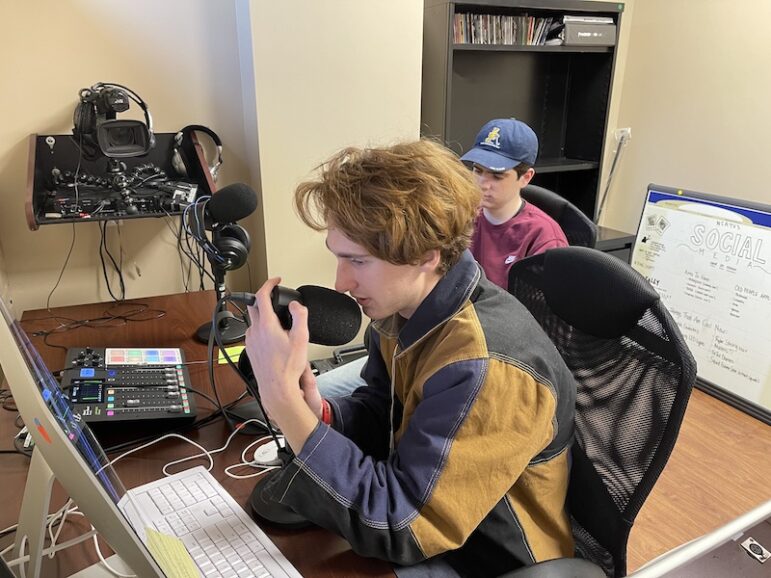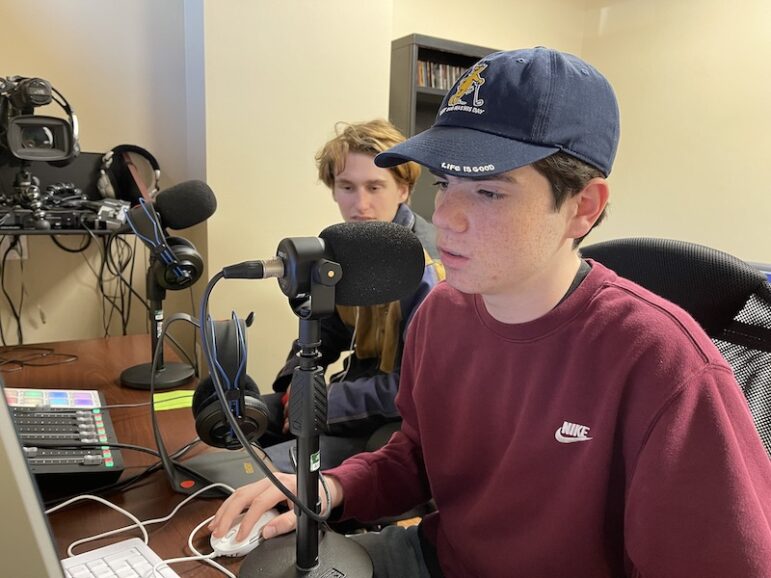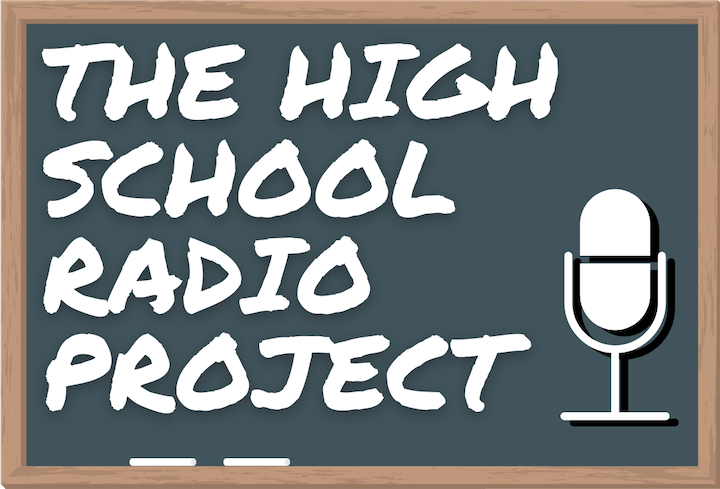
A group of Watertown High School students got a taste of what it’s like to be a radio DJ, putting together their own shows and recording song introductions, banter between tracks, and even interviews with fellow hosts. Their work can be heard on a streaming audio station that airs 24/7.
The students from Watertown, along with a high school in Nebraska, were the first to test the High School Radio Project program, designed to empower students with the opportunity to experiment with radio as a potential career, said WHS Radio & Television Broadcasting Teacher Todd Robbins.
In addition to teaching at the high school, Robbins is a professional sports broadcaster, commentating on games in Central Massachusetts. He has received awards from the Massachusetts Broadcasters Association, and he learned that the group was looking for high schools to run a pilot program.
“When they came to me with a chance for the kids to run a 24/7 radio station, I was like absolutely,” Robbins said.
He chose a group of seniors who had been through his classes over the past four years to lead the effort, and also used students in his podcast and radio news broadcasting class to run between music segments.
Senior and longtime friends Henry Broadstone and Michael Corbett teamed up to DJ some of the broadcasts, with Broadstone focusing on Top 40 hits, and Corbett delving into alternative music.
“For my solo stuff, I mostly focus on what’s going on in the music industry,” said Broadstone, who used to listen to Top 40 stations in the car on the way to school and now enjoys Emerson College’s station. “I mostly do Top 40 so it’s really easy for me to have a headline: boom, boom, boom. If the song that just played was the Weeknd then I could say, ‘Oh, he’s coming out with a new album soon.’ Or, just today I played a Taylor Swift song and interviewed a person who went to a Taylor Swift concert.”

Corbett doesn’t focus as much on the music during his breaks.
“I just kind of talk about things that I like and I try to bring my own personality, rather than just talking about the music, first of all because I don’t know all the music all that well, if we are being honest, and because I think it is easier and I think people enjoy listening to that more,” said Corbett, who used to have a long drive to school in the mornings when he and his Dad would listen to talk radio. He also likes sports talk that is simulcast on TV and radio, like ESPN’s Pat McAfee.
Senior Lexi Burroughs also DJs her own show.
“I cover alternative in the evenings,” Burroughs said. “I am a little quieter because it’s the evening time, you are probably driving home from work and you don’t want to hear some bombastic teenager yelling their head off about something or other, so I keep my tone really chill. I do my best to be thought prevoking without giving people a headache.”
Corbett and Broadstone also have some joint segments where they do more talking than playing music.
“When we are together it’s probably where you see the most of our personality,” Broadstone said. “We like to talk about sports or video games or basically anything we would talk about just together, anyways.”
Robbins said he has likes the pair’s chemistry.
“I would say that’s the thing that has impressed me the most with these guys in particular, is that it has been organic,” Robbins said. “They have been able to generate the content off the top of their heads. I stand in the studio and kind of watch and there is nothing in front of them, no script, there’s no nothing.”
That would be the situation that a professional DJ would face, Robbins said.
“That is pretty much the everyday plan for a professional,” Robbins said. “Yes, they will say we are going to do this segment, this segment, but it is not a word for word script. You have to create it out of thin air whether you are working solo on a show or working with a whole Morning Zoo of people.”
Burroughs prefers to work solo, and she includes info that would be useful for her main audience — WHS students.
“I give heads up to seniors, underclassmen, I talk as if the entire school is listening even though I know they probably aren’t,” Burroughs said. “I am a content creator outside of this. Like, I stream for Twitch and stuff, so talking to myself and making conversation with myself almost comes natural for who I am because it is what I do for a living.”
During one of her sessions she came up with the idea to bring in some other of the WHS radio contributors.
“I usually keep the door closed. I very much keep to myself because I don’t want to make the entire department aware of the fact that I am recording,” Burroughs said. “But for context, I do this during my radio class and everyone else does podcasts next door, so I thought, ‘Hey, what a great idea it would be to promote the podcast that are going on in my class.'”
What may seem like a simple idea, Robbins said, is a big step.
“That kind of initiative, for a student to recognize that, not have me to look at them and say, ‘You know what you should do …'” Robbins said. “That is the kind of next step creativity that is empowering. It’s great to see them own that, take that ownership and then use that power that they have, and take it to the next level.”
The Watertown broadcasters get periodic feedback from Jordan Walton, the Executive Director of the Massachusetts Broadcasters Association, and Robbins shared some thoughts that Walton recently had about some of Burroughs’ recent programs.
“Jordan sent me a note that said, ‘I don’t often get a chance to listen when Lexi is on but she has grown a lot over the last couple of weeks: two really good breaks in a row, one interview with Kate of Raider Recap and one where she rifts for just the right amount of time on color and smoothly goes to a front sell — selling the song that is coming up next),” Robbins said. “He actually took the interview with Kate and Raider Recap and put that on the social media account as well.”
Broadstone said he has become more confident and proficient after a year behind the mic.
“We came into the recording studio and we turned everything on and we kind of sat down and I hit record on the thing and I was like, ‘Wow, this is quite difficult. This is not as easy as I thought it was going to be as far as just recording yourself.'” he recalled. “If I look back on my first, my original recordings, I’d probably be like, ‘This guy has no idea what he’s talking about. He has no idea about how to do transitions.’ or ‘He has no idea how to start phrasing something in a certain way,’ or ‘He is not doing his radio markers.'”
Corbett added that not actually being live gives a nice safety net.
“It being pre-recorded also helps a lot. I don’t know how well I could do something like that live,” Corbett said. “We take our time making mistakes. Sometimes we get too into the conversation and we say something we shouldn’t or we mess up our words. If it were live I would not be able to do that.”

Watertown took a bit of a different approach from the other school piloting the High School Radio Project, Robbins said. While Watertown focused on getting a 24/7 station up and running, Millard West High School in Omaha, Nebraska, worked toward one big live broadcast. They also used some of the features of the High School Radio Project software to program when songs would be played.
The first group of DJs plans to continue their radio careers in some fashion. Broadstone and Corbett will be attending nearby colleges: Clark University and Worcester State, respectively.
“They are sports rivals,” Corbett said. “We could cast games against each other.”
Broadstone added, “That would be really fun!”
Burroughs is headed to Westfield State, which has a radio club. She hopes that her experience at WHS will mean that she won’t be stuck with a late night slot.
Even if he does not go into radio broadcasting, Broadstone said the experience will be valuable.
“Having these skills in the tool box, to take this skill and develop it however I want to is something that I am really, really excited about,” he said. “And knowing that I do have the knowledge and skills to do that is something that is going to be invaluable.”
Speaking on the radio has helped Corbett express himself better.
“I think radio has provided me with just a genuine good experience,” he said. “Just talking, learning how to string things together, and speak like a normal human being is really nice. And I really feel like I’ve had a lot of fun in the classes.”
Burroughs hopes more students can have the experience.
“I really hope that this continues to be something that hopefully spreads a lot further, because there is nothing that can prepare you for a field better than to get hands-on experience in something that you are doing,” Burroughs said.
Robbins expects the High School Radio to continue into the fall, or whenever another high school wants to use the equipment and software provided by the High School Radio Project. Either way, Robbins wants to build off the momentum created in the first year of the radio project.
“Longterm, my hope is eventually, by the time we move into our permanent home (in the new high school) that we will have our own station we would run 24/7 as part of my high school radio classes,” he said.
He hopes that more students can get on the air, with each one getting a block of time each day, and the more advanced students getting the prime morning and evening drive times.
The high school even has a Career Technical Education (CTE) program in Digital Media Communications approved by the state, which is run by Robbins, in which students can get training toward a career in radio or television broadcasting.
In addition to the High School Radio Project streams, the WHS student podcast programming can be heard on Spotify, Apple Podcasts, & Amazon Music — Search: Watertown High School Audio.
Terrific project tho’ talking about “radio” is a bit dated. The radical, even revolutionary transformation of the audio medium has begun and the use of using radio waves/frequencies is quaint and doesn’t adequately reflect where broadcasting is going. Actually, no one knows where. The social and technological forces require a rethinking of how we communicate verbally. On an age of working from home or anywhere what is drive time? When you can consume audio with tract to speech AI generated voices raises issues we’ve only begun to answer. Anyone with a cell phone can make and distribute a podcast and stream a program world wide from anyplace on the planet It’s mind blowing.
So bravo to Todd Robins and Watertown high school students for the initiative but the future of audio, or whatever it is, will demand skills yet to be created. This is a chance to lead the revolution.